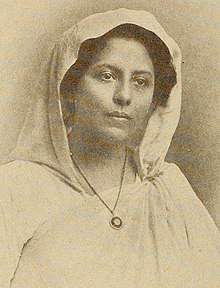Mohini Maya Das
Dora Mohini Maya Das (born about 1884) was an Indian educator and speaker. She was the YWCA's associate general secretary for India, Burma, and Ceylon.

Early life and education
Dora Mohini Maya Das was from Firozpur,[1] born to Christian Indian parents, Rai Bahadur Maya Das[2] and Mohini Chandulal.[3][4] One of her sisters was Constance Prem Nath Dass (1886-1971), a college president in India.[5][6] Another sister, Gunwati (Gertrude) Maya Das, married Raja Maharaj Singh, the first Indian Governor of Bombay, in 1918.[4]
Mohini Maya Das was one of the first three women enrolled in the Forman Christian College at Lahore. She attended the Northfield School for Girls in Massachusetts,[7] and was the first Indian student to attend Mount Holyoke College, when she arrived in 1906. She earned a bachelor's degree there in 1909.[8] While at Mount Holyoke, she was known as Dora Maya Das, and wrote for student publications.[9][10] A play by Mohini Maya Das, "The Hindu Wife of Ram Lal", was performed by the Mount Holyoke Dramatic Club in 1909.[7] After her graduation, the Maya Das Club of the YWCA in Westfield, New York was named in her honor.[11]
Career
Mohini Maya Das (she preferred her Indian personal name to the English name Dora) was the associate general secretary of the YWCA for India, Burma, and Ceylon from 1920 to 1923,[12] and a vice chairman of the General Committee of the World Student Christian Federation from 1922 to 1923.[13] In the latter role, she addressed the World Student Christian Federation conference in Beijing in 1922.[14][15]
Maya Das was critical of white Westerners working in India, including the YWCA, by the time she spoke in Beijing in 1922.[16] "Has the country of religious mysticism nothing for you? Is the East just a market for your goods, just a place to exploit the people? Has it nothing to give you, something you can only find if you endeavor to understand it?" she asked in her lecture. "I beg of you from the West to try to understand us in the East, not in a cursory way but with true knowledge."[17]
She met with Mohandas K. Gandhi on the place of women's work in an independent India, though she could not endorse his strategy of non-cooperation. She took an interest in the Social Service League of Calcutta, and in a summer institute for rural women workers.[8] She served on the executive committee of India's National Christian Council until she resigned at the end of 1923, to marry.[18]
Personal life
Mohini Maya Das married J. N. Dass in early 1924.[12] She continued to write and lecture on religious topics into the 1930s.[19]
References
- "Two East Indian Girls Seek American Schools" San Francisco Chronicle (June 9, 1904): 16. via Newspapers.com

- D. J. Fleming, "Life of a Hindoo Convert" New York Observer and Chronicle (February 21, 1907): 241. via ProQuest
- Daniel Johnson Fleming, Building with India (Central Committee on the United Study of Foreign Missions 1922): 211.
- Doreen Mayadas-Bawa, "A Childhood in India" The Australian Women's Weekly (May 21, 1969): 37. via Trove

- Shobhana Bhattacharji, "A Christian Educator in India: Constance Prem Nath Dass (1886-1971)" paper presented at the Sixth Galway Conference on Colonialism: Education and Empire (24-26 June 2010).
- Nina David, Constance Prem Nath Dass: An Extraordinary History (Bloomsbury Press India 2012). ISBN 9789382563310
- "Men and Women" Greensboro Daily News (January 2, 1909): 4. via Newspapers.com

- Alice Boucher Van Doren, Lighted to Lighten the Hope of India: A study of conditions among women in India (West Medford, MA: The Central Committee on the United Study of Foreign Missions 1922): 139-142.
- Dora Maya Das, "In Short" The Mount Holyoke (March 1907): 296-297.
- Dora Maya Das, "A Hindu Mother's Lullaby" and "Shalamar", in Elizabeth Crane Porter, Frances Lester Warner, eds., A Mount Holyoke Book of Prose and Verse (Riverside Press 1912): 108-109.
- "Some Activities of the Young Women's Christian Association in the Country, in Chautauqua County, N. Y." Rural Manhood (November 1911): 306.
- Elizabeth Wilson, The Story of Fifty Years of the Young Women's Christian Association Of India Burma And Ceylon (Indian National Committee of the YWCA 1925): 55-56, 109.
- Robert P. Wilder, "The World's Christian Students at Peking" Missionary Review of the World (July 1922): 533.
- Laura Rademaker, "Gender, Race, and Twentieth-Century Dissenting Traditions" in Mark P. Hutchinson, ed., The Oxford History of Protestant Dissenting Traditions, Volume V: The Twentieth Century: Themes and Variations in a Global Context (Oxford University Press 2018): 427. ISBN 9780192518224
- Mohini Maya Das, "The Meaning of the Federation Conference to Orientals" The Student World (July 1922): 95-96.
- Karen E. Phoenix, "'Not By Might, Nor By Power, But By Spirit': The Global Reform Efforts of the Young Women's Christian Association in the United States, 1895-1939" (Doctoral dissertation, University of Illinois at Urbana-Champaign 2010): 123-124.
- "India, its Past, Present, and Future" The Weekly Review (April 29, 1922): 342.
- Minutes of a Meeting of the Executive Committee of the National Christian Council, Calcutta, November 22–23, 1923.
- Mrs. Mohini Dass, "What Indian Womanhood Owes to Christ" The Missionary Review of the World (1936): 412.
External links
- Correspondence from 1919-1920, with or concerning Mohini Maya Das, is in a folder of the World Student Christian Federation Records at Yale University Divinity School Library.
- Margaret Allen, "'Force and initiative unusual in an Indian woman': Mohini Maya Das", paper presented at the Australian Women's History Network Conference (Melbourne, March 31-April 1, 2016).
- Margaret Allen, "'Friends Alongside': Feminism and Intercultural Co-operation in Kolkata in the Early Twentieth Century" Australian Feminist Studies 25(66)(December 2010): 463-473.